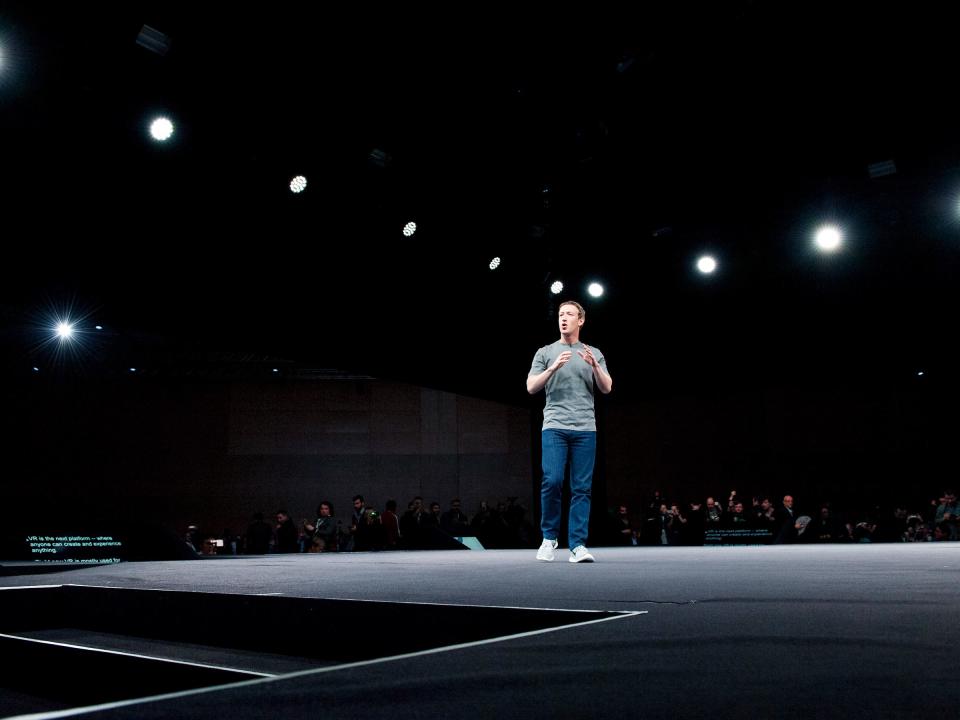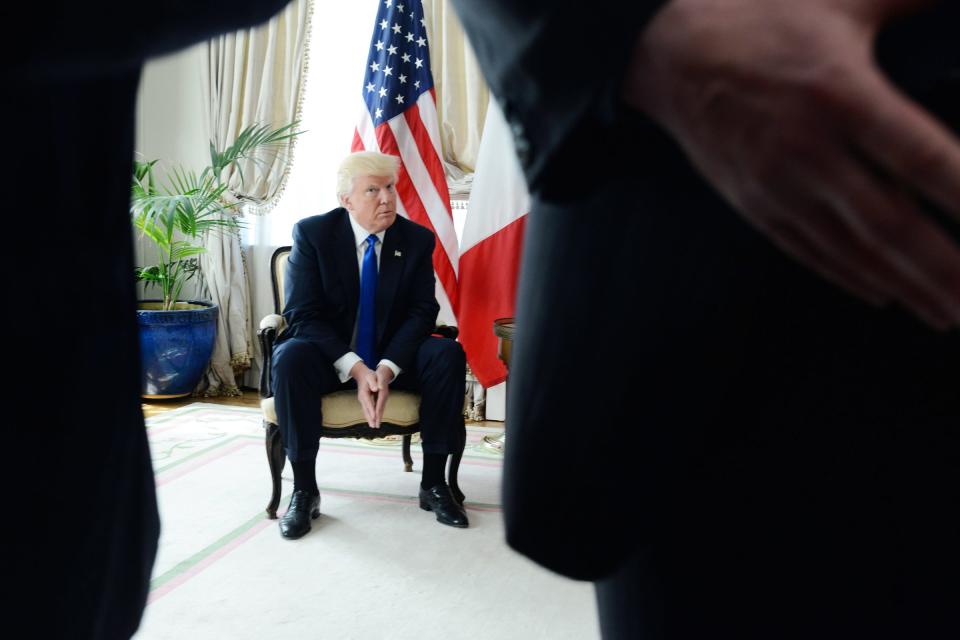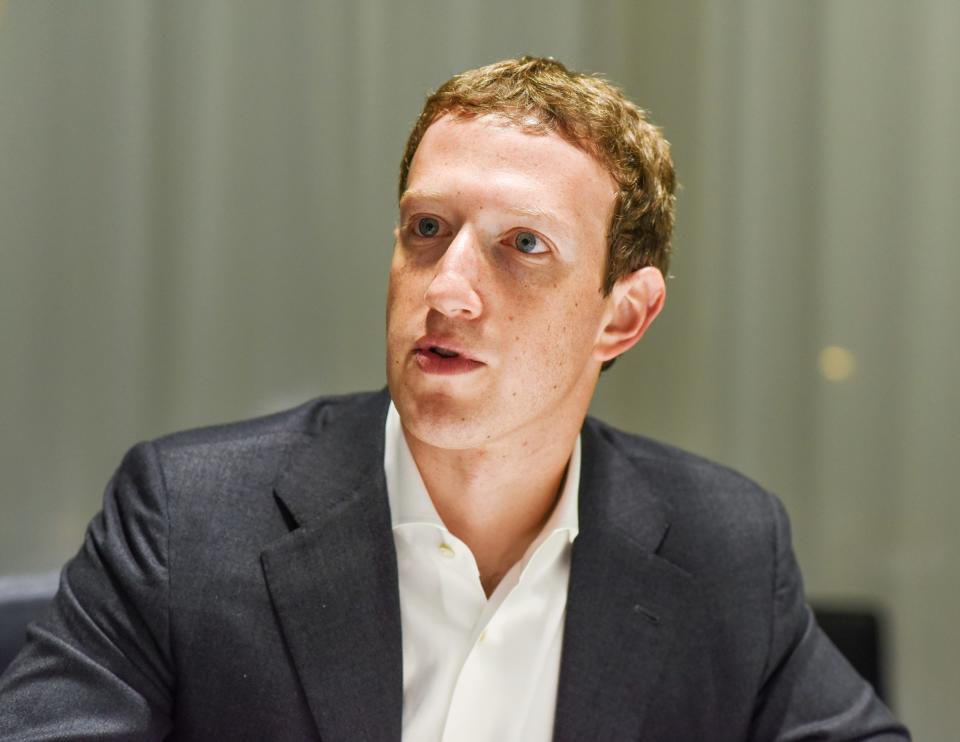Why Facebook Will Struggle to Regulate Political Ads
In 2011, Facebook asked the Federal Election Commission to exempt it from rules requiring political advertisers to disclose who's paying for an ad. Political ads on TV and radio must include such disclosures. But Facebook argued that its ads should be regulated as "small items," similar to bumper stickers, which don’t require disclosures. The FEC ended up deadlocked on the issue, and the question of how to handle digital ads has languished for six years.
Now, it's blowing up again---and damaging Facebook in the process.
The renewed interest follows Facebook's disclosure earlier this month that it had sold $150,000 worth of political ads linked to Russian troll accounts during the 2016 election. Under pressure from investigators, Facebook has turned over records about the ads to Congress and special counsel Robert Mueller III. Some in Congress want to summon Facebook executives to testify about the purchases.
On Thursday, Facebook tried to defuse the controversy. CEO Mark Zuckerberg announced new transparency measures that would require political advertisers on Facebook to disclose who’s paying for their ads and publicly catalog different ad variations they target at Facebook users. Members of Congress, meanwhile, are mulling a bill that would require such disclosures.
These would be unprecedented moves, setting new standards for digital political ads. But they likely wouldn't prevent abuses, largely because of the US's confusing, loophole-ridden system for regulating political advertising.
Case in point: Shortly before the 2016 election, the crowdfunding site, WeSearchr, run by the notorious far-right internet troll Chuck Johnson, raised just over $5,000 to put up a billboard in the battleground state of Pennsylvania. The illustration for the billboard showed a sparkling new yellow-brick wall, marked with a sign reading “U.S. Border.” It was guarded at night by two Pepe frogs dressed as Donald Trump, pointing their guns at anyone who attempts to cross their path. The caption, which appeared next to a smiling crescent moon wearing sunglasses, read ominously, “It’s always darkest before the Don…”
The billboard didn't have to mention its funders---many of whom were anonymous. “That would not fall under campaign finance law,” explains Brendan Fischer, director of Federal Election Commission reform at the Campaign Legal Center. “It doesn’t include any expressed advocacy, saying to vote for or against a candidate.”
In other words, because the Pepe billboard wasn’t purchased by the Trump campaign and didn’t explicitly mention the election, its backers were under no obligation to disclose who paid for it. The same legal gray area would apply on Facebook, but at a much larger---and more dangerous---scale. On Facebook, where most ads are sold by machines, the WeSearchr crew could have bought thousands of digital billboards in a matter of minutes.
That makes this a far more intractable problem than either Facebook or regulators are letting on. “Facebook is so gargantuan, it’s exceeded our capability to manage it,” says Siva Vaidhyanathan, director of the Center for Media and Citizenship at the University of Virginia, who is writing a book on Facebook.
Related Stories
national affairs
In the face of brewing backlash, Facebook is redesigning its election integrity processes and sharing (some) information with Congress.
national affairs
Trump running campaign ads to a select audience on Facebook? That's just how ads work. The scary part is that you can't track them.
Business
Social network says it found $150,000 in political ads from 'inauthentic accounts' and Pages from Russia between 2015 and May 2017
Nothing Zuckerberg announced Thursday or that Congress is considering would have stopped Russian trolls from buying ads during the election, Vaidhyanathan says. Facebook says the Russian ads---like the Pepe billboard----didn’t explicitly mention the candidates or the election. Instead, the ads focused on social issues related to immigration, LGBT rights, and guns, among other things. If Facebook only requires official campaign organizations, or even political action committees, to disclose who’s paying for their ads, it seems these Russia-linked ads would still have been able to fly under the radar.
The same goes for the bill floating in Congress. It would require digital platforms with more than 1 million users to publicly log any “electioneering communications” purchased by anyone who spends more than $10,000 in political ads online. The FEC defines “electioneering communications” as ads “that refer to a federal candidate, are targeted to voters and appear within 30 days of a primary or 60 days of a general election.” Once again, it appears the Russian ads would pass the test. Setting a threshold of $10,000 also allows anyone to develop multiple Facebook pages, buy $9,999 of ads to promote their cause, and remain unnoticed.
Even if Facebook radically expanded the definition of a political ad, though, or if Congress tracked every single dollar spent on Facebook's political ads, there would still be ways to work around it. Anyone could, for instance, form a fake news website, then pay to boost their "news" articles to a broader audience. “There’s a general aversion to a corporation like Facebook or the government defining who is and isn’t media and seeking to regulate or limit it,” says Fischer. “That’s a hard issue.” Facebook is attempting to address that issue by allowing users to mark a post as fake or misleading and banning accounts that have shared such posts multiple times. Even still, in order for an account to be banned, the damage of spreading that misleading information must already have been done.
All of this is why when Zuckerberg said Thursday that it "wouldn't be realistic" to expect Facebook to catch every abuse of the system, he wasn't being fatalist or lazy. He was being honest---albeit, self-servingly so.
"Mark Zuckerberg created a monster in his lab that has grown to proportions that even he could not have predicted," Vaidhyanathan says. "The scale of Facebook gets in the way of any reasonable intervention."
Still, Facebook's self-regulating efforts will at least bring more transparency to ads from politicians' own campaigns. Facebook was an obstacle in the FEC’s 2011 effort to bring more transparency to digital ads. Now, the FEC is re-visiting the issue and, Fischer hopes, Facebook will work with the agency this time on charting a path forward.
"Of course there could still be loopholes. The desire by foreign actors to influence our election is probably not going away, just like the desire for domestic billionaires to influence politics and public opinion isn't going away," Fischer says. "It doesn't mean addressing these issues isn't worth fighting for."
And it is critical that regulators and advocates keep fighting. Facebook may be much happier overseeing itself, but if history is any indication, it may need a little guidance.




